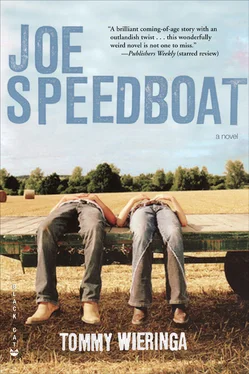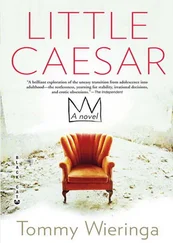That’s how something like that gets started.
And how far do you have to go to be purged of their pity? Not very far. I drank till I fell on my face, lowing like a cow, and they lifted me back into my cart and bought me no more beer. By that time Dirk was already so pissed off that he would have whacked me one if it hadn’t been so unseemly to punch a cripple in public.
What surprised me most was how much noise I made. They thought that was funny at first. The alcohol kindled a fire under my usual soundlessness. It was as though my gullet ripped open, oxygen swirled around and I screamed, man, I screamed. It had been a couple of years since Dirk had heard me make a sound, he couldn’t believe his ears. Once the novelty had worn off, the men just grimaced a bit uneasily as I blasted my foghorn.
‘That’ll be enough of that,’ the barman said.
Dirk yanked on my arm. He could fuck off. The men turned back to the bar, one of them said, ‘They’re all the same, the lot of them.’ And although Dirk knew exactly what he was referring to, he was glad to be able to turn his attention to something else.
‘So what’s that supposed to mean?’
‘What? What are you talking about?’ the man said without turning around.
‘That we’re all the same.’
The man looked at him as though he smelled something foul. This was Dirk in due form, this was what he was known for. I saw the iron descend into his body and the rage darken his eyes; this was the Dirk I knew: old Dirk If-you-can’t-pound-the-shit-out-of-it-then-try-fucking-it Hermans.
‘What’s eating you, asshole?’ the man said.
‘That’s what I thought,’ Dirk said. ‘You dirty piece of shit.’
And before I knew what was happening Dirk had slammed the man’s forehead down on the bar. Blood spattered from his wrinkles. The man came off his stool with a roar and threw himself on my brother, but got such a hard thump that the glasswork tinkled on the shelf. The others jumped up, apparently compelled somehow to act as a unit in the event of an attack from outside, and now Dirk had five on him instead of only one. But, like I said before, he couldn’t count past three anyway. The bastard went down like a drowning man. Two of them dragged him toward the door and the others kicked and punched him so hard that they hurt themselves. They ignored me. When I saw that crowd of mechanics and masons piling onto Dirk, for whom I’d never felt one millisecond of sympathy, let alone brotherly love, something weird happened: I got angry. Almost too angry to breathe. Raging inside me was something you might call ‘the cry of blood’, in any case something I’d never counted on. Reeling under this new sensation, I threw off the brakes and rammed my cart as hard as I could into the scrimmage.
I smashed into a guy who had his back turned to me as he whacked away at Dirk. My cart hit him behind the knees, buckling his legs forward and throwing his upper body back so that I could grab him by the throat with the only weapon I had: my hand. It found his windpipe and squeezed. His arms flailed but found no purchase. The hand squeezed harder, the fingers sinking into flesh. I felt muscles contracting in mortal fear, and the wild pounding of blood. I remember pleasure and the need to kill him. It was going to be easy. Just don’t let go and squeeze harder, that was all. Tear out his gullet. My fingers were tingling. The others let Dirk go and started in on me, they yanked on my arm with that purple head and lolling tongue attached to the end of it, and punched me in the head without mercy. Amid the rain of blows I saw the face growing darker all the time. Oh God please let me murder him—
That’s all I remember.
Only that face, which I remember as being black. And after that day, there were two things I knew:
1. that the man I had wanted to kill was a roofer by the name of Clemens Mulder, and that he would never be my friend;
2. that I had found a new love, namely the release of alcohol, and would be true to it for the rest of my days.
It’s like a chain of little spiders,’ was India’s comment when she saw the stitches on my eyebrow.
She brought me to the garage behind the house, where Joe was jabbing at his arm with a needle.
‘Joe, what are you doing ?!’ India said.
Along the length of his left forearm he had tattooed the letters of his own name: JOE — still bloody, but a clear aquamarine beneath. It was August, the dog days had us all in their grip.
‘What’s up, Frankie, been in a fight?’ Joe asked.
All you had to do was look at me: both eyes blackened with old blood, six stitches across my brow. Joe never got into fights, things like that didn’t happen to him. I realized that I’d crossed the line into the bastards’ domain, joined the ranks of the murderous and, what’s worse, of a family in which the boys started swinging their fists as soon as they came of age. (The Hermans have no girls; ours is a bloodline of gnarls and knots, not of soft things.)
I, who had vowed never to become like them, had plunged headfirst into the first brawl that came my way. If no one had stopped me I would have strangled that roofer. I had fallen, and Joe could tell. He didn’t say much that day, just sat there jabbing more ink into his arm. His jaw muscles pulsed each time the needle pierced his skin.
I left after a while and didn’t see him for a couple of weeks.
In the days that followed I worked on my diaries more than ever, going back to do some necessary checks and amendments.
My thoughts went back to the years before I’d met Joe, before I’d left the world behind for 220 days. So many questions back then. So many that it made me dizzy. There had to be more to it than this, I was sure of it: people couldn’t really be content to live and die the way they did. Some secret was being kept from me, some thing they knew but weren’t telling, something a thousand times more real than this. Wondering why, they say, is the start of all philosophy. For me it was the start of a kind of hell.
‘No whys about it,’ Pa would say. ‘That’s just the way it is.’
And when I kept asking he would smack me up against the side of the head. He was the wrong person to ask, in other words, but that didn’t mean there was no answer; I wasn’t too ignorant to know ignorance when I saw it. So I waited. Somewhere a door would open, someone would explain how it went, and until then I would keep my eyes wide open and keep asking why.
People, I knew, liked to think of life as a stairway. You started at the bottom and kept climbing as life went on. Nursery school, kindergarten and then primary school, where they told you that ‘higher education’ was the answer. That’s where you’d find out about the things you couldn’t see from here.
I believed them. But I was consumed by impatience, so I went on asking why until it started getting really irritating. In their eyes I was just being cheeky, overplaying my hand. As though I was asking to speak to God himself.
I wouldn’t want to pretend that I, with all those questions of mine, was the kind of kid you’d have found endearing. More like autistic. Back then my thinking had an aggravating severity to it that I’ve never even approached since. The same kind of barebones austerity I later came to admire in the philosophy of the samurai.
And the answer didn’t come. I’d expected a lot from high school. Biology, history, literature. . that’s where it was going to happen. It had to be buried somewhere inside that pile of books I lugged around each day.
But the books spoke with the voices of teachers, or the teachers spoke with the voices of books: how that worked was never quite clear to me. They taught me skills, but provided no answers.
Until then, my ‘why’ had always been referred on. But this, for the time being, was where the buck stopped, this was where I was going to stay for the next five years; these same mouths would speak to me the whole time and, to my horror and dismay, I discovered that my question wasn’t particularly popular here either. Things were what they were, and it didn’t do to go poking around in it too much — just like Pa said.
Читать дальше












